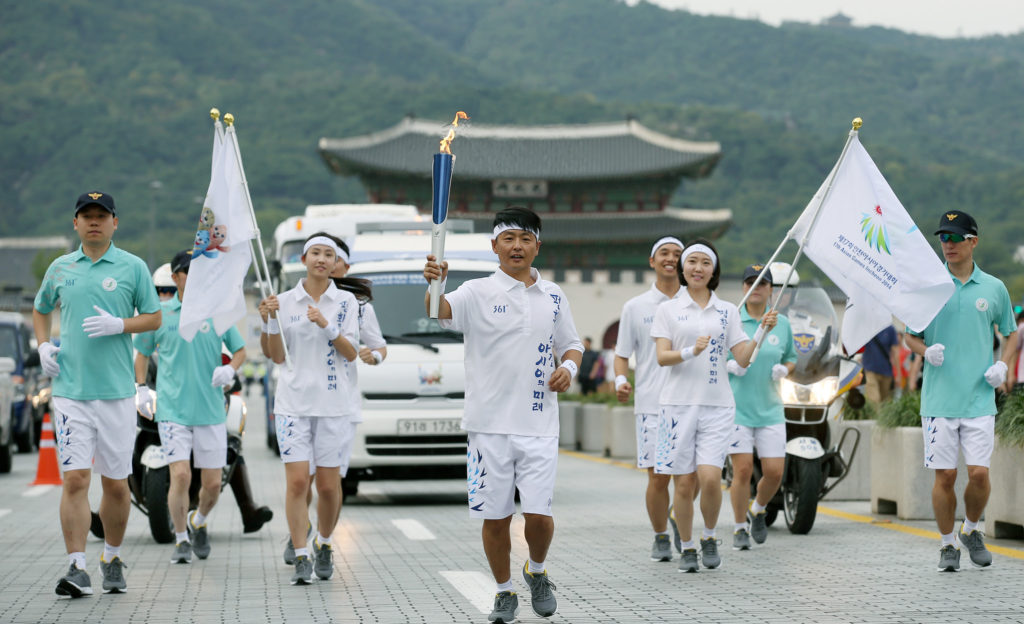The Peninsula
September 2014: Two Good Opportunities, But No Big Meetings in Inter-Korean Relations
Published October 1, 2014
Author: Nicholas Hamisevicz
Category: North Korea, Inter-Korean, South Korea

By Nicholas Hamisevicz
In September, there were two chances for North and South Korea to have high-level meetings, yet they were unable to take advantage of those opportunities. The Incheon Asian Games and the opening of United Nations General Assembly had the potential for the two Koreas to develop positive momentum in inter-Korean relations with communication at higher levels of government than are usually the case. However, without a successful meeting, North and South Korea are continuing to state their positions and offer differing terms for potential talks. Inter-Korean relations still appear to have little flexibility for sustainable, constructive interactions that reduce tensions and create opportunities for other negotiations with North Korea.
The Incheon Asian Games were thought to be a good opportunity for inter-Korean relations. Kim Jong-un supported North Korea’s participation in this year’s Asian Games in Incheon, South Korea and stated it could help inter-Korean ties. The two sides were in negotiations over the number of North Korean participants for the Asian Games, North Korean cheerleaders, costs, security, and other logistics. While there was no high-level meeting before the Asian Games, there is still a small possibility after the completion of the Games on October 4 for the two Koreas to do something.
The United Nations General Assembly meeting in late September provided another opportunity for North and South Korea to meet. Park Geun-hye suggested that South Korea’s foreign minister, Yun Byung-se, could meet with North Korea’s foreign minister, Ri Su Yong, in New York. However, no meeting was held. Yet, there was a smaller version of inter-Korean interaction; North Korea’s foreign minister met with United Nations Secretary General Ban Ki-moon, a former South Korean foreign minister. During that meeting, Ri Su Yong gave Ban Ki-moon a letter from Kim Jong-un. Ban Ki-moon didn’t reveal the contents of the letter but said he pushed for better inter-Korean relations and denuclearization.
Even without a successful high-level meeting stemming from these two events, both Koreas have still been trying to establish their positions and conditions for talks. The North Korean government recently demanded South Korea remove the May 24th sanctions, end the suspension of the Mount Kumgang tours, and stop South Korean citizens from sending balloons filled with anti-Kim regime leaflets into North Korea as preconditions for inter-Korean dialogue. Recently, South Korea’s Minister of Unification Ryoo Kihl-jae stated that South Korea was willing to put everything on the agenda for discussion, including the May 24th sanctions, but North Korea would need to come to inter-Korean talks to converse over these issues. The Park Geun-hye administration also approved aid to be sent to North Korea by local South Korean groups. Apparently, the Park administration is also reconsidering allowing aid groups to send fertilizer to North Korea as well; the South Korean government seemed initially hesitant about allowing fertilizer as part of aid packages to North Korea, preferring humanitarian assistance closely connected with helping women, children, and people sick with infectious diseases.
While these moves suggest the South Korean government is looking to demonstrate some flexibility in inter-Korean dialogue, President Park has also decided to push the human rights issue with North Korea. Calling human rights a “core agenda” in South Korea’s policy toward North Korea, Park Geun-hye discussed North Korean human rights during her speech at the UN General Assembly and urged South Korea’s National Assembly to pass a bill on North Korean human rights. It will be interesting to see if this human rights push derails opportunities with North Korea or is actually an avenue for discussion. North Korea released its own report on the human rights condition in its country, likely in response to the UN Commission of Inquiry report. This could mean there are areas open for discussion with North Korea over human rights; however, it is difficult to tell if North Korea is willing to talk with South Korea about those issues.
Two good openings for further dialogue came in September for the two Koreas. Unable to connect during the UN General Assembly, North and South Korea are also running out of time to build off of the interactions from the Asian Games. Improvement of inter-Korean relations is often seen as a key to enhancing progress in other exchanges with North Korea. However, September 2014 was not the month for this process.
Nicholas Hamisevicz is the Director of Research and Academic Affairs at the Korea Economic Institute of America. The views expressed here are the author’s alone.
Photo from the Republic of Korea’s photostream on flickr Creative Commons.
